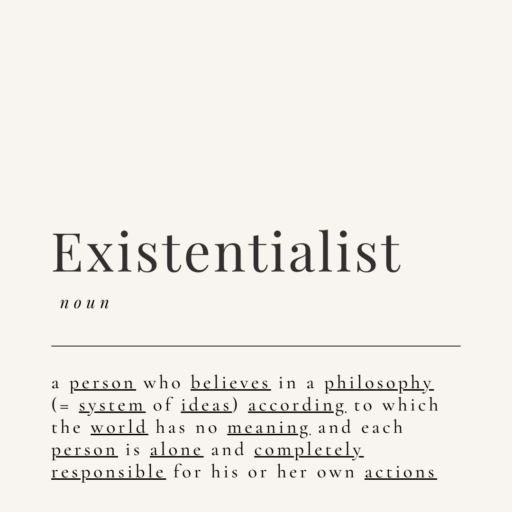Freedom for whom?: Comparative Critique to Sartrian and Beauvoirian Existentialist Thesis
10 Mart 2024Sarah Nauman
French philosophers Jean-Paul Sartre and Simone de Beauvoir’s writing is set against existential angst and the turmoil regarding the purpose of life. In this essay, I will discuss how their work is reflected by themes of freedom, personal responsibility and subjectivity and the answer to the meaning of life.
A post World War II setting was characterized by a strong feeling of disillusionment and questioning of established beliefs. Sartre and Beauvoir were part of a broader movement of existentialism, which focused on the personal subjective experience, the freedom of choice, and the search for individual authenticity in an uncertain environment. Sartre and Beauvoir’s works attempted to address the essential issues of human existence, freedom, and purpose of life.
While Beauvoir and Sartre had an intellectual and romantic relationship, their individual philosophies have distinct characteristics. We can gain a more thorough understanding of their ideologies by examining the nuances in their philosophies regarding the meaning of life in their work, Existentialism is a Humanism by Sartre (1946) and the Ethics of Ambiguity (1947) by Beauvoir.
“Existence precedes essence”. This famous quote is penned by Sarte, regarded as the father of existentialism. He claims that humans lack an integral “essence” that separates them from other beings. Humans are not born with a predetermined purpose, like animals or objects. While an animal’s existence is dictated by its nature, and the purpose of an object is defined by its function, human life is not determined by anything.
As Sartre states, “man first of all exists, encounters himself, surges up in the world – and defines himself afterwards.” Individuals should perceive themselves as conscious beings who have an awareness of their existence in the world. As a result, humans exist in the world first and make meaning for their own lives via their choices and behaviors.
When Sartre says, ‘Man is condemned to be free’ (p. 23) he means that humans are inherently free, but that this freedom comes with a weight of responsibility. Individuals are entirely culpable for their choices and their consequences after being thrust into the world with no purpose or moral guidelines. This freedom might be viewed as a ‘condemnation’.
Sartre emphasized the necessity of authenticity and personal effort. A staunch atheist (p.20), he opens up the possibility of authentic self-creation. The meaning of life arises from the choices and efforts that individuals make, as well as the principles that they define via their actions.
Humanism is a broad phrase that refers to any idea that places humans at the core of everything. Sartre’s humanism promotes the dignity of human beings, as well as the importance of individual agency in the creation of all values. Sartre’s humanism also reflects optimism in a way. No doctrine is more optimistic [than existentialism], since it declares that man’s destiny lies within himself (p.29). Humanity’s destiny in our own hands: Sartre quotes Francis Ponge, saying, “Man is the future of man” (p.34).
Sartre opposes determinism, which he refers to as ‘deterministic excuses’, the concept that human actions are predestined by external factors or conditions over which one has no control. He argues that people are not dictated by external circumstances or intrinsic characteristics, but rather have the ability to surpass such circumstances to create a life that is defined by their choices.
In this way, Sartre’s existentialism contains the concept of ‘bad faith’, to describe a state of self-betrayal and self-deception. Bad faith arises as an attempt to disregard one’s own responsibility for their decisions. As a result, those ‘deterministic excuses’ would be a form of ‘bad faith’. Individuals exonerate themselves of the choices they make and blame their actions on other reasons like as cultural and societal standards, biological determinism, or other predetermined forces, denying themselves agency and freedom.
‘There is no reality except in action’. Accepting the autonomy, one has while acknowledging full responsibility for one’s decisions, according to Sartre, is fundamental for living an authentic and meaningful life.
Published in 1948 in a post-World War II setting, Simone de Beauvoir’s The Ethics of Ambiguity is a foundational text of existentialist philosophy. The work outlines a practical system of ethics and is an analysis of freedom in relation to the human condition of ambiguity. It conveys a nuanced approach that extends beyond individual responsibility and states the interdependence of ethical decisions in an uncertain environment.
The core tenet of Beauvoir’s philosophy is the understanding of ambiguity as an inherent part of human existence. According to her, people exist in this ambiguity of freedom and limitation, individuality and dependence. ‘As long as there have been men…. they have all felt this tragic ambiguity of their condition’ (p. 2). This acceptance suggests an understanding of the complexity and multiple dimensions of human experience, giving rise to finding the meaning of life.
She argues that humans are both free and restricted, capable of choosing their own lives but confined by social, biological and historical forces. Beauvoir emphasizes the need of confronting the uncertainty of one’s life and making decisions that are true to one’s actual self.
According to Beauvoir, people are inherently, fundamentally free, and this freedom entails the responsibility to make meaning in an unpredictably ambiguous world. (p.57). Freedom is a human condition that necessitates us to establish our own values and meanings in a world of uncertainty and chaos, but this freedom is coupled with a responsibility to utilize it ethically. Ethics is the triumph of freedom over facticity. (p. 18).
According to de Beauvoir, there is an ambiguity between an individual’s past that decides the nature of their present, and the future they are going to freely create. We feel the ethical weight of every choice we make since the consequences of our current actions are not yet understood. Beauvoir says that this is just one facet of the uncertainty of human experience.
Humans are also ambiguous concerning their dual nature, which de Beauvoir believes is made up of both matter(body) and thought(consciousness). Human consciousness is reliant on but distinct from the physical or material parts of our existence. Humans may transcend their physicality in thought, but they can not escape it. Freedom and moral responsibility arise from our capacity to think beyond our physical restrictions. De Beauvoir writes, “to will oneself moral and to will oneself free are one and the same decision” (p. 24)
Beauvoir feels that realizing one’s own freedom does not exclude others from doing the same; in fact, de Beauvoir believes that preserving the freedom of others is essential to maintaining our own freedom. As she confronts the repressive systems that limit women’s freedom and contribute to their subjection, Beauvoir’s feminist perspective is crucial to her interpretation of the meaning of life.
Beauvoir emphasizes the essential connection between freedom and moral responsibility by saying that choosing to be moral and choosing to be free are two sides of the same coin. Genuine freedom is not just the absence of limitations, but consciously choosing to act ethically. By actively engaging with our freedom, our moral character is formed to make meaningful decisions in the face of ambiguity.
Both important figures in the existentialist movement, Sartre and Beauvoir’s philosophies shared several similarities. They affirmed human freedom and individual responsibility. Individuals must confront the implications of their freedom and accept responsibility in order to determine their own lives.
Their writings reflected different perspectives as well. Sartre favored existential phenomenology, emphasizing the subjective experience of freedom, consciousness and authenticity. However, Beauvoir highlights how social institutions, notably gender roles, impede individual freedom and add to societal oppression. Beauvoir’s detailed work on feminism is demonstrated in her quintessential work ‘The Second Sex’ (1949).
While these disagreements exist, Sartre and Beauvoir were involved in an intellectual movement and influenced each other. Their writings should be analyzed as complementary to the larger existentialist debate rather than as opposing viewpoints.
Understanding the power of choice as rendered by Sartre and Beauvoir led me to choose these thinkers to write about. As pioneers in their field, I was intrigued to read their work and try to understand the purpose of individual existence. My initial personal assessment found their beliefs harsh, as it is easy, even hopeful to assume that what happens to us, by our own choice, is not entirely our fault.
But while reading Sartre and Beauvoir, I understood that they found hope in different places. By taking complete accountability, Sartre emerges hope from individual freedom and the contingency of life and Beauvoir emphasizes this hope in solidarity, collective action and social change. Their pragmatic beliefs may not offer salvation, but then again, humans have to create their own salvation.
The profound works by Jean-Paul Sartre and Simone de Beauvoir are still influential today. world of philosophy and beyond. Their existentialist beliefs are still relevant in today’s contemporary setting. Sartre and Beauvoir have left a long intellectual legacy to address the complex nature of human existence.
References:
Sartre, J.-P. (2007). Existentialism is a humanism (C. Macomber, Trans.). Yale University Press
Beauvoir, S. (1948). The Ethics of Ambiguity (Fretchman, B.). Citadel Press

